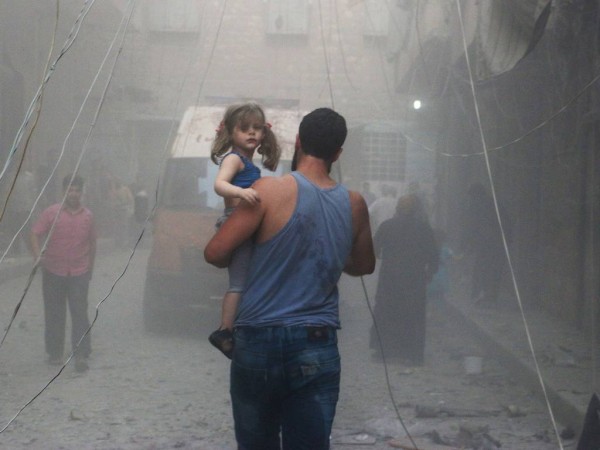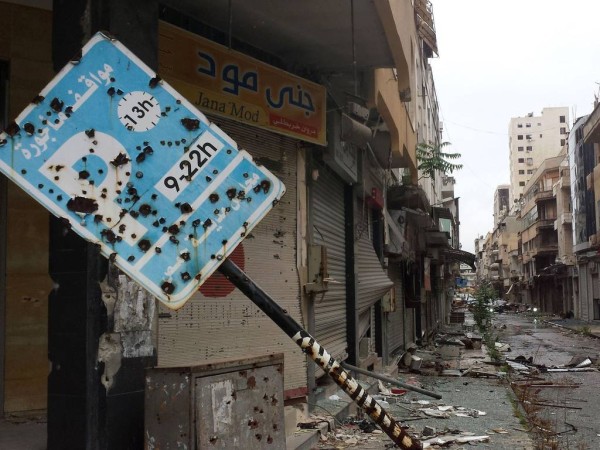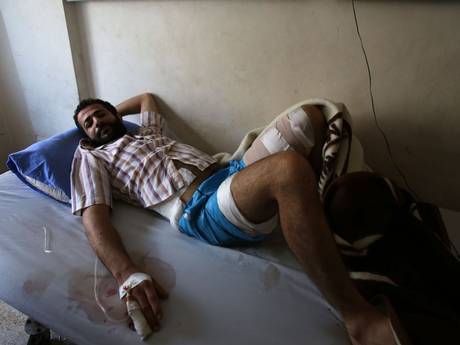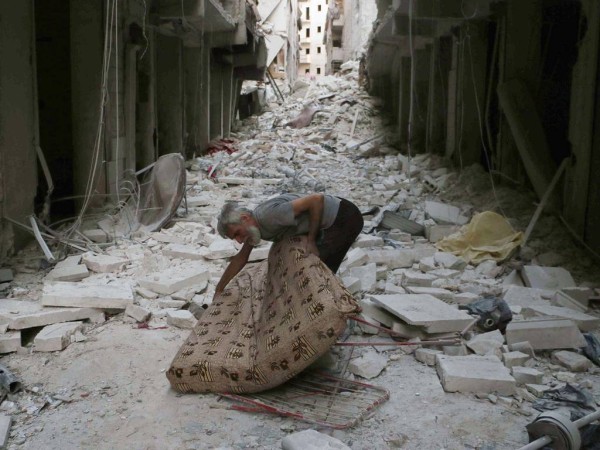PBS: Escaping Eritrea … [Read More...] about ካብ ውሽጢ ቤት ማእሰርታት ኤርትራ
The Syria hospital siege that turned into a massacre: Jisr al-Shugour breakout was less of a ‘victory’ than Damascus claims
Robert Fisk, SATURDAY 06 JUNE 2015, The Independent (UK)
Assad’s regime needed to win a psychological war at Jisr al-Shugour, and defeat is not a word used by Damascus. Robert Fisk reports from Syria on how a massacre during an Islamist attack on a hospital was transformed into a victory
First the Islamist gunmen picked off the Syrian checkpoints around Jisr al-Shugour, firing at ambulances taking the wounded to hospital, creating panic among civilians who poured into the centre of the town – much as the Muslims of Bosnia had fled for their lives under Serb attacks into the towns of the Drina Valley almost 25 years ago.
It was the last week of April. Alaa Mohamed, a driver in the Syrian army’s medical service, was told to take the dying to the civilian-military medical complex south-west of Jisr, where he found chaos in the corridors of the overcrowded three-storey hospital.
“My ambulance was hit several times and in the end someone fired a thermal missile at it and that was the end of my attempt to get the wounded. I got to the hospital and asked to join in the defence of the building and I found Colonel Mohamed Salhah who was making plans for this. By then, the gunmen were coming in their hundreds at us, setting off car bombs. Suicide bombers were crashing their vehicles into the hospital walls.”
Sgt Yassir Faraj of the Syrian 10th Armoured Division was manning a checkpoint to the east of the town when he and his comrades were attacked with rocket-propelled grenades, and were almost overwhelmed. “We retreated and I went to the hospital and reported for duty there,” he says from his hospital bed in Latakia. “I called my colonel, the commander of my battalion, and told him I had got out safely. He said to set up a strong point by the walls and to start handing out provisions. There were maybe 500, or perhaps 520, people. Our group had 10 heavy machine guns and our Kalashnikov rifles and that was it.”
For an incredible 30 days, the soldiers and some of the civilian men along with families of the military defenders, held off the attacks by Jabhat al-Nusra. On 20 May, the city of Palmyra, 200 miles to the south-west of Jisr, had fallen to Isis, or the “Islamic State”. Knowing that news of the Jisr siege was being followed on television by millions of shocked Syrians, President Bashar al-Assad ordered his army along the Orontes River to the south to break through to the hospital. The relief force, including soldiers of the Syrian 18th Armoured and 10th Infantry Divisions, eventually battered their way up to the village of Frikeh, from where they could see the Jisr hospital complex, through the smoke of the battle, scarcely two miles away. But it was a town too far.
Repeatedly in recent weeks, Islamist groups from Jabhat al-Nusra and Isis have used the tactics that were employed so efficiently by Serb militias to clear Muslims from Bosnian territories they wished to “cleanse” in 1992. In Ramadi in Iraq, in Jisr al-Shugour and most recently in Palmyra in Syria, Islamist forces have created fear and committed massacres in order to seize territory. Certainly the throat-cutting and “cleansing” of villages in the present-day Middle East civil conflicts – shorn of their religious context – have much in common with the horrors of Bosnia. Opponents of the Syrian regime have accused government militias of employing the same tactics in 2012. But in the Syrian and Iraqi wars, of course, Muslims are killing mostly Muslims.
Ambulance driver Alaa Mohamed, safe today in the military hospital in Latakia, described to The Independent how Jabhat al-Nusra Islamist fighters surrounded them with several thousand men. “We had not seen this before – they came room to room with suicide belts. They were blowing the inside walls down – they smashed them from outside with suicide cars and bulldozers and then sent their men into the building. But we killed them all.”
Jisr al-Shugour stands on the upper Orontes River scarcely five miles from the Turkish frontier, and is – or was – served by a railway line that connected Latakia to Aleppo, and at one point ran only yards from the Turkish border wire. Little surprise, then, that Syrian officers in the hospital and their commanders behind government lines to the south remain convinced that the attack was launched by Nusra men who were able to cross with heavy weapons from Turkey into Syria. To understand the frustration of the relief force, you only have to stand as I did last week on the edge of the destroyed village of Frikeh – from which you can see the distant wreckage of the hospital.
Desperate to maintain the resistance of the soldiers and civilians in the hospital, Syrian helicopter pilots began dropping supplies by night – including food, ammunition and mobile phones, even batteries for the civilians trapped inside to repower their own mobiles to talk to their families. Some packages fell inevitably into the Nusra lines, others into the one location outside the medical complex which the defenders could reach without being shot by snipers.
But in the third week of May, Syrian army intelligence officers behind government lines to the south picked up signals from Jabhat al-Nusra that they had dug a tunnel deep beneath the hospital complex – a common tactic used by Islamists against government targets in Aleppo – and were about to blow the medical buildings up over the heads of the defenders.
The town itself had been taken by the rebels between 23 and 25 April – they have variously claimed their victory over a three-day period – but at 11pm on 21 May, the soldiers inside the isolated hospital were told to prepare a break-out. A first group of 50 Syrian troops was to act as an attacking force against the Nusra men surrounding them, a second section of soldiers to protect the civilians and the wounded, a third to form a rearguard. Inexplicably, the order was then delayed until 7am the following morning. The 500 men, women and children in the hospital were to run for their lives in daylight.Sgt Faraj, at 26 years old a veteran of the Syrian war, was told that the soldiers were to run in twos, one to help the other if they were wounded. It was help he would soon need. “We ran into the open and down the road and into a storm of bullets. I was shot in the leg and fell down, but my colleague helped me up. I looked across the Orontes and I suddenly saw all these men shooting at us. They had lots of tanks and BMPs [amphibious armoured vehicles] and were heading towards us and were shooting missiles at us. Where did they all come from? One officer shouted that it was “every man for himself”. I crawled half a kilometre and found Colonel Youssef Ahmed, asked him for water and he gave me water. By then the gunmen were so close, I could hear them talking in Turkish.”
Many Syrians who have lived close to the Turkish border speak the Turkish language, although Sgt Faraj admitted he was not fluent. “Some of the other men were speaking in Arabic,” he said. “One of the rebel groups appeared to be soldiers from the Syrian army and they came close to us so I said ‘come over here to us’ but they suddenly started shouting ‘Infidels! You filth!’ One of them tried to throw a grenade at us and I managed to use my gun and we fired at them and killed them. But another group all had hand grenades and they started running towards us. I rolled down the side of a hill and I managed to run despite my wounds. Then I and my colleagues, we found ourselves among many bodies, some of them civilians.”
In the days to come, the Syrian regime was to present the carnage at Jisr al-Shugour as a symbolic victory of heroic proportions, a historic break-out by its soldiers who risked their lives – and sometimes died – to protect the civilians from the cruelty of Islamist killers. The soldiers were undoubtedly courageous and died they did, trying to save the lives of the innocent. But when Syria was reeling at the advances of Islamist fighters in both Iraq and Syria – up to 5,000 Syrian soldiers were to evacuate the neighbouring town of Ariha in far less heroic circumstances shortly after Jisr fell – it was not thought wise to reveal that far more soldiers and civilians were killed or fell into the hands of the rebels in Jisr than ever made it out, wounded and alive, to the front lines of the waiting Syrian forces to the south. Surely Syria cannot afford many more “victories” like this.
Private Mohamed Turkmani, a member of the Syrian 45th Special Forces Regiment, was wounded almost as soon as he left the hospital. “The first bullet hit me in the hand and then another bullet went through my ear. I could hear all the bullets. I saw death with my own eyes. I prayed the shahada [the Muslim prayer for God’s grace]. But I still managed to fight and fire my gun.” Private Turkmani, who was also hit in both thighs, was swathed in bandages and sitting cross-legged on his bed in a blue dressing-gown when I met him in the Latakia military hospital, one bullet still inside his leg. Like the other soldiers – who spoke to The Independent without their officers present – his account was one of pain and tragedy.
“There were people falling. I saw a mother with a daughter and a little boy and they were all with us and then a sniper shot her, and her son whom she was holding by the hand dropped to the ground, and she turned to another soldier and cried out: ‘Take my daughter’. The woman and the little boy both died.”

Private Turkmani had no idea that just a few hours earlier, I had met the mother’s little girl, Sahar – who was rescued by another soldier, Private Bassil Hammoud, and whose horrifying story was told in The Independent earlier this week. Sahar’s grandmother Asia, who is now looking after Sahar, has still not been given official notice of her daughter’s and grandson’s deaths. Private Turkmani is one of the few witnesses to the killing of 30-year-old schoolteacher Asma Qanbar and her 10-year-old son, Hashem.
Some of the gunmen, Private Turkmani remembered, were trying to persuade the wounded to surrender. “Some of them were shouting ‘turn yourself in, soldiers’ and one of the rebels was almost on top of me so I didn’t move. Some men who showed they were alive were immediately shot.”
Over the following hours, the surviving soldiers and civilians were slowly scattered into small groups. Private Turkmani, who had the presence of mind before the break-out to strap a mobile phone to his body in a protective plastic bag, lay at the foot of a cliff with two other soldiers until nightfall and then began walking beside the Orontes. “Every few minutes, we would see gunmen standing guard. They had night-vision goggles and floodlights set up to try to find us. The only thing to do was to go into the river and we swam to the other side. We walked in the wheat fields until it became dawn, but we found we were still surrounded by the rebels.”
Private Turkmani believes he spent five days and nights crawling and hiding and sleeping by day – and then staggering across a highway near the village of Kfeir – before he escaped the thousands of rebels south of Jisr. Although Syrian troops had reached the heights of Frikeh to the east, most of the survivors trekked south for five miles. “Sometimes we just had to lie in the fields and there were dead bodies lying around,” Private Turkmani says. “They were smelling terribly because they had been in the sun for so long. Yes, there were civilians.” Then Private Turkmani found two of his comrades from whom he had been separated during the hospital breakout. They included Sgt Yassir Faraj.
The men slept in a shepherd’s hut for a night. They ate the chaff of wheat and drank from the putrid waters of the river. In a last moment of terror, they were confronted by five armed men and the soldiers in desperation opened fire at all of them. Both Sgt Faraj and Private Turkmani believe they killed them all. They now used Private Turkmani’s mobile phone to call the number of a senior officer. “He asked ‘Where are you, Yassir?” Sgt Faraj recalls. The officer promised to send a car with its headlights on, but Sgt Faraj reported back that he could see nothing, that tracer bullets were criss-crossing the sky. Finally, they reached a bridge and thought they saw Syrian soldiers standing on it.
“We weren’t sure,” Sgt Faraj says. “But I said to my friends that you only die once and I shouted to the men on the bridge to show identity papers, and a captain switched on a torch so I could see his papers. And so we were saved. You would not imagine my joy – I would never part from this joy or give it away.”
The men were taken to a military field hospital in the village of Shatha where dozens of wounded soldiers and civilians were now gathered. Some had bullets in their lungs and a trail of ambulances took them across the mountains to the Mediterranean port of Latakia to a military hospital where Dr Badia al-Atrash directed them to operating theatres and wards. “We received over 120 wounded,” he says. “They were civilians who had been hit by shrapnel and bullets at close range. They had been shot by snipers. Some had head injuries and most of these died. Some had already died in the ambulances on the way here. We have no exact figures but perhaps 20 to 30 people died here in the hospital”.
And herein lies the rub of this story. Military figures suggest that those who left the Jisr al-Shugour hospital – both soldiers and civilians – numbered more than 450, a slightly lower figure than some of the soldiers suggested at the time. Well over a hundred civilians and an unknown number of soldiers, it appears, never made it past the initial breakout. Many are thought to have been taken prisoner and there are persistent and credible rumours than the soldiers among them were executed. The civilian hospital had a military wing with medical staff serving army patients – perhaps 28 in all – and few appeared to have escaped.
Twelve families – almost all the civilians who escaped were Sunni Muslims, the religious sect of the Jabhat al-Nusra attackers – are known to have reached Latakia, comprising perhaps 60 people. But it appears that of the men, women and children who fled the hospital on 22 May, far less than half of them reached safety, some of whom subsequently died. One military source said he thought 175 soldiers and civilians out of the 450 to 500 in the hospital reached safety. But the Syrian government was in need of a victory at Jisr al-Shugour and defeat is not a word used by the regime in Damascus.
As for the Syrian army, their adversaries were clearly better armed and outnumbered the soldiers. Jabhat al-Nusra possessed night-vision goggles – essential for any modern war – yet the Syrian military had none. How did this equipment reach Nusra? And what was Turkey’s role in the fall of Jisr al-Shugour?
Unlike the Iraqi army to the east – which has repeatedly collapsed in the face of Islamist enemies – the Syrian army, the strongest institution in the state, is still a fighting machine. It is not, as its enemies suggest, collapsing. But it is outnumbered and out-gunned. And no army can survive forever against that equation.
